#the roman archivist
Text
Covers for my fic series, Learning to Live With Ourselves, which is a rewrite of the ending of the Dream SMP parallel to canon that explores C!Tubbo through the lens of Dissociative Identity Disorder! Each alter is based either upon an abandoned plotline or upon a persona C!Tubbo has!
Links beneath the cut to read!

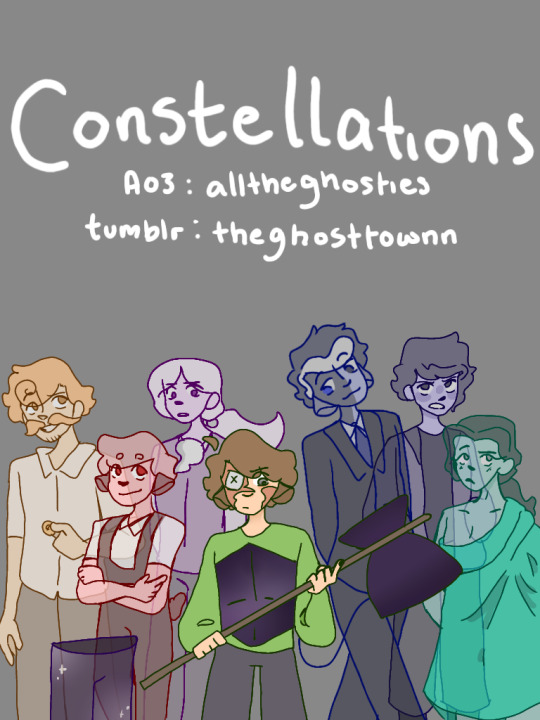
#dream smp#dsmp#mcyt#tubbo#fanart#pubbo#the roman archivist#big law#big crime#mr. beets#kiss your knuckles#constellations
37 notes
·
View notes
Text
The season 1 Jonathan "Martin is the worst employee ever" Sims to season 5 Jonathan "you are my reason" Sims pipeline is just 🤌
#jonathan sims#martin blackwood#tma#tma podcast#the magnus archives#gay archivists#this is my roman empire#im very feral about these two soft beans
480 notes
·
View notes
Text
so i was pondering this one incorrect quote

and that got me thinking…
slight spoilers ahead for later seasons of both sanders sides and the magnus archives!!




crossover au, anyone? :)
#so for anybody confused on who each character is supposed to be#logan is jon the archivist-#orange is the embodiment of the eye/ceaseless watcher/whatever tf you wanna call it#patton is martin- virgil is annabelle (though i couldn’t decide between her and gerry…)#and roman is tim :)#i’m thinking of making a lot more doodles for this au because i love crossing my hyperfixations teehee#sanders sides#thomas sanders#sanders sides spoilers#the magnus archives#rusty quill#tma spoilers#crossover au
25 notes
·
View notes
Text
Yeesssss Nat Geo
Give me that docuseries on ancient rome
u know the shit I like 👀
#I'm going back to school for history#specifically roman history#actually I'm going to work on becoming an archivist
0 notes
Text
Assorted historical notes for the first chapter of my jedtavius fic (happy pride everybody...)
~ Romans took their public baths extremely seriously, and setting one up would be high priority for a garrison stationed out in the territories (basically the situation in these movies?) Nudity in the context of baths was just normal.
~ For some reason, Octavius wears his cape slung across his chest
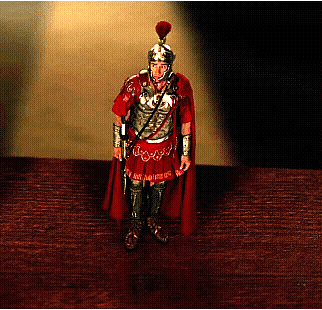
instead of pinned to his shoulder(s) like a Roman cape.
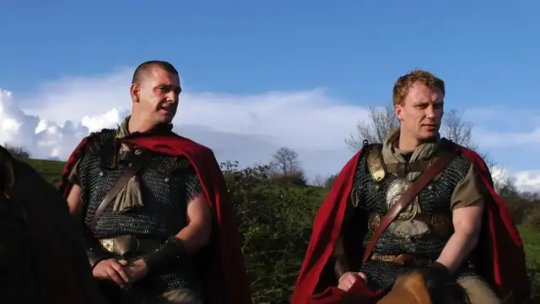
If anything, this seems to be riffing on the 1600s half-cape, which is often strung cross-body like that in a sort of Renaissance *costume.*
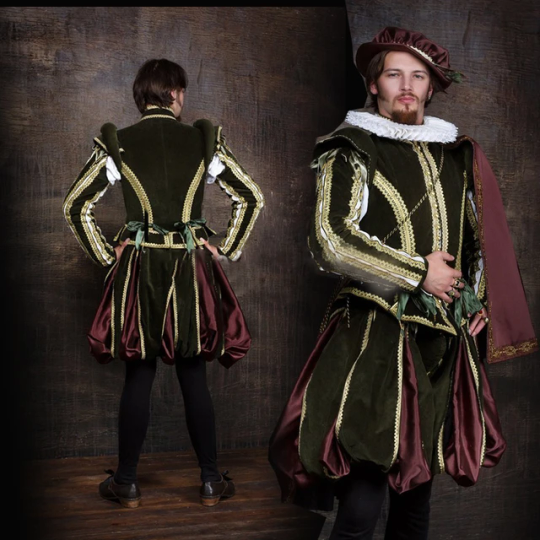
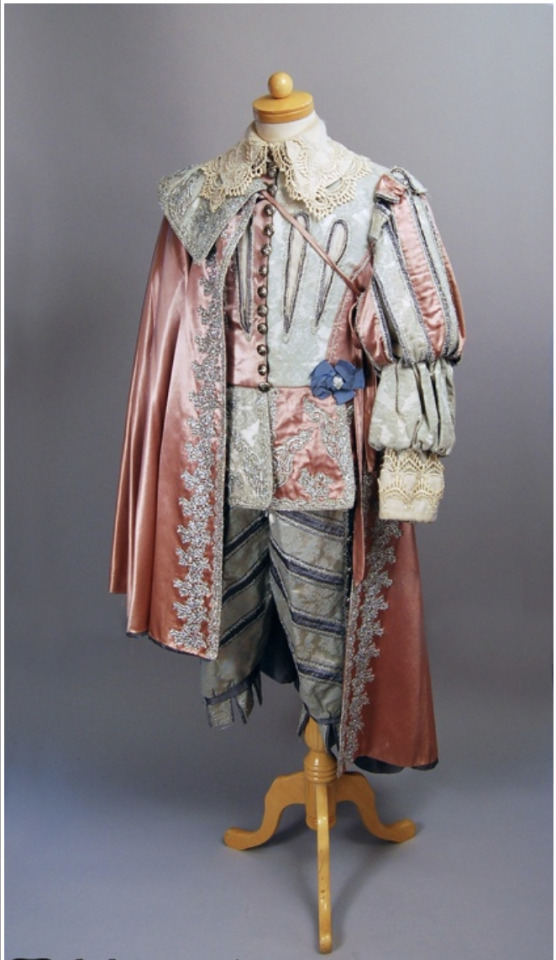
Note: these are both modern historical costumes. It seems in the actual 1600s it was more normal to just sort of balance your capelet on one arm, or wear it over both shoulders (like when you wear a big coat without putting your arms through the sleeves.)
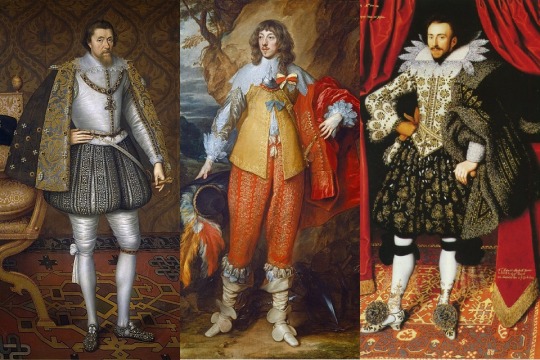
1600s capes are especially annoying to study, because basically all of them were tailored into 1700s coats, but WHATEVER.
(diegetically, since Octavius the tiny Roman lives in a museum, I guess he could be influenced by the 1600s cape costume, and just decide to wear his cape like that.)
~ “Sinister” is just Latin for “on the left side.” Couldn’t resist a latin joke, especially since Owen Wilson (and therefore Jed) is left-handed.
~ Roman orgies and sex parties were not really all that common. Like sure, they're brought up in the context of Caligula, Nero, Tiberus - the classics. But, your Roman writers historians and archivists were extremely political, and when you hear about this stuff there is always a political motive behind it, and almost certainly some exaggeration. Roman writers loved their gossip.
However, as a literary trope 'the Roman orgy' is extremely important. Most people in the buttoned-up 1800s saw Rome as this fascinating but immoral free-for-all, and we haven't totally shaken that off. And since Octavius is written as a slightly comic version of our current cultural idea of ‘Roman’... orgies are absolutely part of that.
(It’s the same reason I threw in the two-handed ‘Roman Handshake,’ even though as far as I can figure out, it was invented for a production of Julius Caesar in 1898. Romans seemed to just - shake hands.)
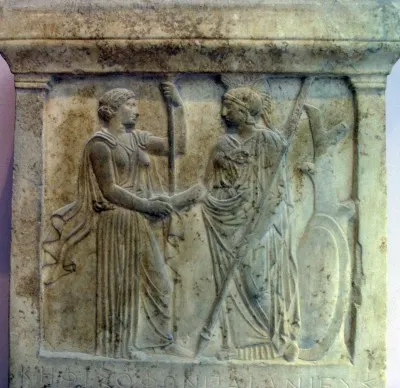
~ One of the interesting thing about the The Night at the Museum franchise is its interest in exploring the 21st century Idea of a Roman, the Idea of a Cowboy, the Idea of Theodore Roosevelt (even more than the historical reality.) It's a plot point that Museum Exhibit!Teddy knows that he's not Teddy Roosevelt, and kind of struggles with the symbolic importance people give to him. Octavius is very much a Movie!Roman, not a History!Roman. Even the fact that he's played by a British actor with a very British accent makes him seem like a background Roman General in Ben-Hur, here to deliver a letter, say "Yes sir, the rebels have returned from the provinces with new allies," and then die half an hour from the end to raise the stakes.
The exception to this is Ahkmenrah, who as a mummy that comes to life, is not a museum exhibit, he's just A Guy and *that's* the joke. He's not engaging with, or symbolic of 21st century tropes and stereotypes surrounding the idea of "pharaoh." He's just a person doing his own thing. Compare this to Kahmunrah from the sequel, who IS both a pharaoh and an exhibit come to life. So of course he's all about the literary tropes historically attached to the linked ideas "pharaoh, desert, villain." He's sadistic, he's camp, he's super queer coded, he's got a lisp, and he's putting our hero in a hour-glass death trap just like Jafar.
#night at the museum#my fic#spa day#jedtavius#Ahkmenrah#Kahmunrah#natm meta#natm octavius#history stuff#fashion history#costuming stuff#literary analysis
59 notes
·
View notes
Note
(@tempest-toss)
A pathway opened, and out stepped the first of Tempest's overseers. Bearing a roman numeral one on her lapel, it seems she was the first overseer, the Archivist. She seemed to be dressed in average garb for an overseer.
Right behind her stepped a tall man with violet hair and fox ears, wearing a beautiful silk kimono with a roman numeral two stitched on it. The others are probably arriving in sequential fashion. Two gives a respectful bow, allowing all nine tails to unfurl themselves.
Next came Three, who looked to be a bit of a modern hipster, wearing glasses and a scarf and giving a chipper wave. His hands were covered by a set of victorian gloves, ones that barely withheld the Wondertainment tattoo on his wrists.
With a loud stomp, a herculean build ducked through the portal. Standing at 14 feet was the large werewolf deity, Four. His heavy antlers nearly scratching the ceiling, some petals from his antlers falling as they made contact.
In a complete contrast, out came a small child, the one and only Five. With a polite bow and spin she skips her way out of the way of the portal.
Two individuals come out next, Six and Seven. Six comes through in his human form, the only marker of his true nature being some scales along his neck. Seven is dressed in a full business suit, taking the casual out of business casual. Her outfit hides methods to kill, lest the assassin needs it.
Eight comes out next, who like Three, bears a more modern outfit. They smile before signing a thankful message of being invited here. Nine stumbles out right after them, hunched over and looking a bit miserable. The skittish alchemist is wearing a half-mask, trying to cover up something wrong with his face.
Ten arrives and is dressed in almost completely modern attire. He still looks professional, taking his job serious, but it seems he's having a bit of fun with it.
Eleven and Twelve arrives next. Eleven is dressed in an expensive Italian suit, while Twelve is dressed in more shabby clothing to hide his wings. Eleven makes a joking read about Twelve, earning a hiss from the insectoid, who reveals his mandibles in anger.
The last three arrive and shut the portal behind them. Thirteen gives a salute, stowing away her titular sniper rifle on her back. She holds up a laptop displaying 13-ii. The screen flickers, showing a familiar duo-chrome face briefly.
"Greetings Alternate Council."
He speaks in a familiar robotic fashion. Three Fourteens, dressed like Ten, begin to chatter among themselves before the center one claps and the Fourteens merge into a single one. Then he gives a polite wave
[Zero meets the group at the enterance to Site-01, which appears as a large mansion. The building's front door visiblly grows in size to accomodate the newcommers.]
ᎶᏒᏋᏋᏖᎥᏁᎶᏕ! ᎥᏖ'Ꮥ Ꮧ ᎮᏝᏋᏗᏕᏬᏒᏋ ᏖᎧ ᎷᏋᏋᏖ ᏗᏝᏝ ᎧᎦ ᎩᎧᏬ ᎥᏁ ᎮᏋᏒᏕᎧᏁ! Ꭵ ᏗᎷ ፚᏋᏒᎧ, ᏖᏂᏋ ᏗᎴᎷᎥᏁᎥᏕᏖᏒᏗᏖᎧᏒ ᎧᎦ ᏖᏂᎥᏕ ᏇᎧᏒᏝᎴ'Ꮥ ᎦᎧᏬᏁᎴᏗᏖᎥᎧᏁ. ᎮᏝᏋᏗᏕᏋ, ፈᎧᎷᏋ ᎥᏁᏕᎥᎴᏋ.
(Greetings! It's a pleasure to meet all of you in person! I am Zero, the Administrator of this world's Foundation. Please, come inside.)
96 notes
·
View notes
Text

Well I will gladly take a look at the fully revealed logo!
Though I will say that red-archivist pointed out some good stuff in this post. But we can take a deeper look into certain things!

Also p.s.: You will want to read the giant ramble to the end, because I noticed something as I was finishing, and it puts everything in an interesting context.
As mentioned in that post, the combination of the alchemical symbols for salt, mercury, and sulphur do indeed form the tria prima, the three primes or components of life.
⊖ or salt, which represents the earth and the human body. In alchemy it also symbolises the lower consciousness, self-knowledge, and wisdom.
☿ or mercury I already covered last time, representing the mind, the omnipresent spirit of life, and stood as symbol for intellect, imagination, moral judgement, and the higher mental faculties. The alchemical associations of mercury have a strong connection with the Greek/Roman gods Hermes/Mercury, a messenger god who also acted as a chthonic deity, a psychopomp and god of boundaries to be exact. Which might be relevant, might not. (He was also a shepherd god, just adding that detail)
🜍 or sulphur represents the spirit or soul of all materials and living things. In alchemy it is seen as synonymous with consciousness and the expansion of thought. And is seen as the bridge that connects the body with mind, thus it is seen as the key to understanding the inner workings of the soul and consciousness.
It’s interesting to me that the sulphur is in the logo 4 times, connected to the circle that encompasses the salt and mercury symbols, and the chevrons (I’ll get to those in a moment). This could have been purely aesthetic, but they could have also simply opted to have the sulphur symbol instead of one of the chevrons and have pretty much the same effect. Instead they chose the alchemical symbol of the soul, also seen as what ties body and mind together, also an element that is strongly associated with heat and fire, to encompass the body and mind, together with heraldic symbols of protection. It’s an interesting choice which makes me wonder about the mindset of the people who founded this organisation. (Maybe they are the types to believe in purifying fire, or purity of the soul as a way to protect oneself against the horrors out there? Who knows.)
The double ^ are chevrons, a heraldic symbol associated with protection, and meant to represent the roof of a house. Even the name is derived from the French word for “rafter”. It is also used in military or police uniforms to indicate rank or length of service.
It is interesting to me that the bottom left chevron is an inverted version of the top right. The inverted version being next to the symbol for mercury or the mind, and the regular next to the symbol for salt or the body. Without it being in full colour, I can’t say much about any particular heraldic or symbolic links that might have. At most I can speculate that maybe it’s hinting at how the mind might not be as safe as the body in such a service, of course that can also be my own knowledge of TMA colouring my interpretation.
The O.I.A.R. in the top banner has been revealed! And it’s nice to get confirmation that I guessed correctly on the R! Personally I am not very good with acronyms, but @emdashingaway correctly guessed that it would be this. In my previous post about The Magnus Protocol logo she pointed out that it might stand for Office of Incident Assessment and Response, which now seems very plausible!
Now the background has some interesting repeating symbols too.
🜏
This is the Leviathan Cross, in alchemy another symbol associated with sulphur (in particular black sulphur) and thus also the soul. However it is worth noting that Anton LaVey, founder of the Church of Satan, has adopted the Leviathan Cross as a symbol of his Church in the 1960s. Though I can’t immediately find much more about it and its origins beyond the alchemical association and the very modern Satanic association. (The name Leviathan strikes me as interesting too, but there is too much that can be said about it, especially for a symbol that just occurs in the background.)
🜇
This is the alchemical symbol for aqua regia (derived from the Latin for “royal water” or “regal water”), it is a mixture of is a mixture of nitric acid and hydrochloric acid, optimally in a molar ratio of 1:3. Historically aqua regia was used in alchemy in the process of attempting to create the philosopher’s stone. It is also used to help dissolve gold and platinum within actual chemistry!
♁
Is the symbol for antimony is associated with the animal nature or wild spirit of man and nature, and it was often symbolised by the wolf.
🜘
This is the symbol for bismuth, while it does get mentioned in alchemical texts, the particular use and associations seem to be unclear. All that I can seem to find is that in early days, it was often confused for tin or lead. And that apparently Miners in the age of alchemy also gave bismuth the name tectum argenti, or “silver being made”. (Also it’s chemical symbol is Bi, which is funny given how apparently some have discovered that they are bi thanks to TMA)

I hope this is visible, but one of the symbols in the background also looks an awful lot like one of the alchemical symbols for tin. It looks like a curved X with circles at the ends of the legs. Tin in alchemy is associated with the planet Jupiter, and is sometimes called the ‘breath of life. ’ It represents the idea that the whole is stronger than the sum of its parts.
⚥
From what I can find, this is not strictly speaking an alchemical symbol. Clearly a combination of the male and female gender symbols (each of which is actually derived from the symbols for Mars and Venus respectively, which do get used in alchemy actually), it is generally seen as a hermaphroditic symbol (using the strict broad biological label here, not referring to intersex, I just want to point that out). But given all of the alchemy references so far, I suspect that it might be referencing the rebis (from the Latin res bina, meaning dual or double matter), the ultimate end product of the alchemical great work. It is sometimes described as the divine hermaphrodite—a reconciliation of spirit and matter, a being of both male and female qualities. A lot can be said about the great work in alchemy, and this post is already long enough honestly.
And lastly…

Take this, flip it upside-down, and you have the shape of the logo in which all these symbols are displayed. This is the symbol for the philosophers’ stone. In alchemy it is an unknown substance sought after by alchemists, said to be capable of turning base metals into precious ones (like gold and silver), can be used to derive an elixir of life, and was even thought to bring about spiritual revitalisation. And it symbolises perfection at its finest, enlightenment, and heavenly bliss.
And while researching this, I also noticed something rather interesting. It might end up not being relevant at all, but I discovered that a famous alchemist was named Albertus Magnus who was born some time before 1200 in the Duchy of Bavaria (the flag and coat of arms of which during the Wittelsbach dynasty sports a rather nice diamond pattern, a bit like the pattern you see within the triangle of the logo). He was a saint with a deep interest in a large variety of topics including logic, theology, botany, geography, astronomy, astrology, alchemy, mineralogy, zoology, physiology, phrenology, justice, law, etc. I recommend potentially checking out the wiki page on Albertus Magnus that I shared earlier if you are interested in knowing more, there is a lot of history there. But it’s interesting that he shares a surname with Jonah Magnus, founder of the Magnus Institute.
Conclusion:
Given all that I have managed to dig up about the symbols within the logo, and the indirectly connected links with suspiciously named historical figures, in particular with the context of there being another Bouchard within the Magnus Protocol, I can’t help but be suspicious of whatever this British civil service is actually getting up to behind the scenes. In particular what they think they might be trying to accomplish using the Fear Entities.
Of course at this point it becomes pure speculation. But I am more than happy to hear everyone’s ideas, speculation, and contributions!
#the magnus protocol#tmagp#the magnus archives#rusty quill#turns out asks don't show up in the tags how annoying#also I want to point out that I am by no means an expert on alchemy#I simply enjoy research#Share your theories though! It's fun to discuss that kind of stuff!
206 notes
·
View notes
Text
heyyy, somehow gained many new followers recently. thank you very much for enjoying my work! in light of that, let's do a small introduction.
i'm Seosamh Dáire, or you can call me joe. he/him • sé/é only. transsexual butch man and leatherdyke ✦ fear tras/aiteach agus gearrán 🐗

i'm a painter, comic author-illustrator, web/html artist, petty designer, smalltime archivist, passionate marxist. i like anime and virtual pets both from ~1990. as someone working primarily with past decades, i'm interested in broadening our ideas of time/place and who was in it. pro-palestine, native rights and strong proponent/student of irish-native solidarity, blm, roma, the works (uninterested in debating these topics!)
i make trans gay art for perverts and i was recently an artist in residence in the Burren, focusing on traditional paintings and reflecting/writing on being Queer In The Land.
SUPERPOSE: the tremendous dark trans sci-fi comic i make with my life+work partner Anka @kingfisher-cove . take a look! this project is my whole LIFE, and almost every piece i make pertains to it, so if you're unsure of who or what my images are of, that's a safe bet. the comic is recommended for mature readers. here's a brief synopsis,
An ongoing queer sci-fi horror comic about physics.
On the Atlantic coast, in a town called PORT CITY— “a place out of time”
While a tourist destination boasting a popular beach and boardwalk, Port City is also home to ROMAN LABS, an aerospace-turned-tech company now floundering in the tech boom.
Rafael and Royal are each listless in their own lives as longtime locals with little mobility, whose orbits have only occasionally overlapped, until now. Turning a job at the lab into a last-ditch effort for a glimpse of a more equitable future brings Royal and Rafael together, and beaches Kas, a young physicist, on Port City’s shores.
Together they seize the opportunity to alter their future and carve out a place in time for themselves, finally shaking the town and their lives from standstill. Changing history begins with the machine.
(also a supplementary web art/ARG aspect, using flat digital spaces to create a sense of 3d depth and narrative.)
SUPERPOSEBLOG @superposeblog is the repository for all updates and news about the comic.
198X.LOVE our homepage & portfolio
PATREON is where i share most of my work first, early comic pages, WIP, process and thoughts and other resources. it's a direct way to support mine & my partner's work. we are an independent team of two and i'm sure you can appreciate the effort and dedication to managing our practise as well as life obligations. for one-time support, there's also ko-fi. thank you!
i've also begun a new, as of yet unnamed 18+ comic about trans disposability/sapped as a resource + weird blood + nuclear war. so look out for that next year 😘
#introduction#illustration#superpose#comic#webcomic#painting#queer#trans#butch#dyke#he/him#trans artists#artists on tumblr#q&a#please don't call me transmasc
128 notes
·
View notes
Text
Camellia: Copia x f!reader - Chapter 6

Camellia: n. - A flower which symbolizes a deep desire or longing.
Summary: Even though you have finally begun to translate Elizabeth's diary, you still need context. A visit from the archivist answers some questions but raises even more.
Word count: 4.6k
A/N: Helloooooo! Thank you all again for your extraordinary patience in the long wait for this chapter. It isn't the most eventful (nor am I the proudest of it) but things are definitely happening, and I think you all will enjoy where it's going!
P.s., the identity of the archivist was inspired by the lovely @writingjourney <3
Warnings: Nihil being a bad dad (again), descriptions of anxiety/panic, descriptions of afab people being seen as objects
AO3 / Chapter 1 / 2 / 3 / 4 / 5
Secondo thinks that abdicating the position of Papa might be the best thing to ever happen to him.
That’s not to say he disliked being Papa. Quite the opposite, really—holding the scepter, wearing the crown, and hearing the title were all a generous ego boost. But the aspect he loved the most was that he could promote the tenets of the Lord Below how he wanted, how he felt was most effective. He was the mouthpiece of Satan, the proprietor of His word and the bridge between his unholy flock and the fires of Hell.
But that’s about it. He loved the glory, sure. He did not like the man that the Ministry molded him into. Once he stepped down, it was hard to look himself in the eye without cringing. He was supposed to hold the power for Satan, not the Clergy, and certainly not for Sister Imperator.
Just about the only thing he has to thank that woman for is the time he’s gotten back after “stepping down.”
Secondo has always been interested in the archives, ever since he was a boy. He would sneak around the Abbey in Rome into places he shouldn’t have been and see things he probably shouldn’t have seen, and keep everything he saw to himself. Having the knowledge of secrets he wasn’t supposed to know made him feel important, like he held some power over the Clergy if he decided to open his mouth.
So when he'd stumbled upon a dim room towards the back of the library at the tender age of eight, he thought he’d found the Library of Alexandria. Wall-to-wall shelves of thick leather bound books, stacks of tightly-rolled parchment and linens depicting unholy scenes. An old wooden table holding a desk lamp and a magnifying glass. A single lone lamp that, when he’d pulled the chain to illuminate it, had emanated a click so loud that he thought he’d be caught for sure.
He’d been so disappointed when he realized he couldn’t understand any of the books or scrolls or linens. They were all written in a language unfamiliar, which he knows now to be Latin. But at eight years old, his primary focus was to learn the unholy scripture, to serve Satan in his duties as an altar boy, and to make his father proud.
That last point… he never did accomplish.
But he did eventually learn Latin, so that he could read what was in that dim room. He’d learned to shimmy the lock open (the Roman Abbey is ancient, it wasn’t a difficult task) and sneak in, absorbing as much information as he could.
Secondo learned about rituals that haven’t been done in centuries. He read prayers and psalms that had been forgotten with time. He found drawings of long lost artifacts and relics shrouded in mystery. Each new bit of knowledge gave him that rush of adrenaline that could only come from forbidden things.
When he was old enough, he was allowed into the archive room. Of course, no one had known he’d already spent countless hours there. His father wanted him to know his family history if he were to take up the helm of Papa one day. You need to know what is in your blood, his father had said. Just as Primo does, and just as Terzo will.
Secondo had wanted to ask, what about Copia? But he kept his mouth shut. He didn’t want his archive privileges revoked as soon as he’d gotten them.
The first thing he’d done was find his family tree. Who came before him? Who was Papa before his father, and before his father’s father? How far back did the Emeritus bloodline really go?
It was in the family tome that he first discovered the words Primus Motor. Up until a specific time, every Emeritus heir had been conceived by a woman with the title Prime Mover. Then the women proceeding them had lost that title, with seemingly no pomp or circumstance. Nearly a thousand years ago, the title had been dropped and forgotten. The final Prime Mover, it seems, had been a woman named Elizabeth.
When her diary had been found in some random basement room of the Abbey, Secondo immediately requested to be the archivist in charge. She was his ancestor, and the last Prime Mover on record. Her diary must have an explanation, or some insight as to what exactly a Prime Mover is. There were Prime Mover rituals outlined in those books he’d found as a boy, sure. But none ever explained what the significance was beyond “the chosen maternal body.” It all sounded rather dehumanizing.
But Sister Imperator had told him to keep that fact a secret. She’d brought in a translator to decipher the diary without telling her the whole story. So, he wasn’t terribly surprised to learn that you’d requested to speak to him, or that when he finds you in the restricted room, you look like a deer caught in headlights.
“Papa,” you say, standing to greet him formally. You bow your head out of respect and give him your name. “I can be out of your way, if you need—”
Secondo simply puts a hand up to stop you. “No, sorella. I am here to speak to you about the diary, as you requested.”
Your eyes go so wide that he almost laughs. “Wh-what?” You swallow. “Forgive me, Papa, I didn’t know that you are the archivist who evaluated Elizabeth’s diary…”
“Is that going to be a problem?” Secondo asks.
“No! No,” you scramble, shaking your head slightly to align your own thoughts. His intense gaze pins you to the spot, and not in a good way. Not a bad way, either, but… not in the way Copia’s gaze does.
Determined not to make a fool of yourself, you steel your nerves. “It’s not a problem, Papa. I apologize. I have only… the highest member of the Clergy I have ever met until I arrived here was Bishop Beaumont. I still find myself a bit overwhelmed, sometimes.”
The corners of Secondo’s painted lips tick up at your admission, but he makes no mention of it. “No matter. What is it you wished to discuss?”
You sit and turn your notebook around so Secondo can read the translation of the first line. Today I was chosen to be Papa’s Prime Mover.
“I was wondering,” you begin, “if you might be able to tell me what a Prime Mover is.”
After reading the translated line, Secondo leans back. “I do not know much,” he answers gruffly. “But I do know that it was an esteemed position. Something to do with continuing the bloodline. However the title of Prime Mover is no longer used.”
“How come?” You ask.
“I do not know.”
You hum and look down at Elizabeth’s diary, like it might speak the answer to you itself. Something to do with continuing the bloodline? “Sister Imperator told me that you estimated this diary to be about five hundred years old,” you say. “Is there a reason you chose that number?”
At Secondo’s silence, you meet his eyes again to find that his brows are furrowed and his jaw is set. His lips form a tight line, deepening the clefts beside his mouth. “I only ask because it may help with context,” you offer, defending your question. Your chest flutters with nerves again. You hope you haven’t somehow angered him… he’s quite intimidating.
Secondo’s mind turns. Sister Imperator hadn’t told you that he was the archivist, and she’d told you a different number than the one he’d estimated. She asked him to keep Elizabeth’s status as the last Prime Mover a secret. It seems odd, like she knows something that she wants neither you nor Secondo to. He finds himself annoyed that Sister wants to keep something shrouded in such unnecessary mystery.
“Sister Imperator has given you the wrong number,” he says after a moment of tense silence. “I believe it is nearly a thousand years old.”
“A thousand?” You gape. For a volume that’s a millennium old, it’s in remarkably good shape. You’d thought the same when you believed it was just five hundred years old.
Secondo nods. Whatever reasons that Sister Imperator has for wanting to keep the diary a secret, he doesn’t know. But if he can do anything to learn about his family and its history, or if he can spite Sister… he’ll take that chance. “Elizabeth is the last Prime Mover on record. I do not know why the title was dropped, and I do not know why it is supposed to be such a secret.”
Oh. Yes, you understand. Papa must have his reasons for disliking Sister, and you have your own. If you can contravene her in this small way, a secret kept between an archivist and a translator, you will. You’re slightly ashamed that the thought makes you a little giddy, but not ashamed enough to not do it.
“So,” you guess, “you’re hoping that this diary answers that?”
“Correct,” Papa nods again, and stands. “I ask that you keep me informed, sorella.”
“Of course, Papa,” you say with a polite smile.
He leaves the restricted room and you’re left alone with Elizabeth again. Only this time, there is a new clarity between you and your subject. Your gaze drops down to the pages of jumbled letters, wondering.
Papa Secondo had said that the position of Prime Mover was esteemed. If it had been, why was it dissolved? Perhaps it wasn’t dissolved at all, and it was only forgotten? And… the position is related to the Papal bloodline, so surely these Prime Movers would have been the mothers, right?
The answers lie in front of you, waiting to be translated. Elizabeth herself beckons you with her slanted script, saying, read me. Hear what I have to say.
And how you want to focus. How you want to spend the next weeks painstakingly deciphering letter by letter, word by word until you find these answers which will sate your curiosity. But, damn it to Hell, all you want to do is find Copia and tell him what you’ve found out. You want to tell him that you’re still here, that Sister Imperator had agreed to let you stay after your dramatic, last-minute discovery. You want to ask him all sorts of questions about what he might know of Prime Movers or his ancestors. You want to watch the excitement bloom in his eyes as it always does when you speak about the diary.
You have your reservations, though. Going to Copia on anything other than Ministry business feels like you’re overstepping your position. Who are you to assume that you’re important enough to him to just pop in?
In those moments in the gardens, and in the chapel, though… it sure felt like you were. He had looked at you like you were. In the gardens he was Copia, and you find within yourself that you’d rather be sent back to Liège than see Copia as only Papa again.
~~~
It’s been two days since Copia has seen you. Two full days since he’d watched you half-waddle down the Sibling corridor, soaking wet and shivering and covered in mud from the knees down, and he can’t focus on anything whatsoever.
There’s some official bulletin or another on his desk, awaiting his signature to distribute it out to the rest of the Ministry, but he can’t bring himself to pick up his pen and sign it. Not for a lack of caring—the bulletin is actually quite important—but because he’s conjured up this beautiful picture of you in his head, and he’s afraid that if he moves he’ll lose it.
You must be busy. You’d told him you had an idea about the cipher on your way up the hill out of the gardens, and if he hasn’t so much as gotten a glimpse of you around the Abbey, it must have been a breakthrough. He knows how frustrated you’d been, how determined you were to figure it out, as you’d said. I want to stay and figure it out.
Another part of Copia’s mind, the part he doesn’t want to listen to but that is so very loud, tells him that perhaps your idea had been wrong, and Sister Imperator had sent you home. Maybe the reason he hasn’t seen you is because you’re not even here anymore.
So, he keeps still, his eyes unseeing as he stares into nothing but his own mental image of you. If you’re really gone, at least he has this. You might not be gone, but he’s almost scared to go looking for you because he might find that you are. As it stands, you are Schrödinger's Sister of Sin. Here, and not.
His, and not.
“Al diavolo questo,” Copia grumbles to himself, pushing himself up from his chair. He rounds his desk, sending a few loose papers (including the bulletin he’s supposed to sign by the end of the day) to the floor, and swings open the door to his office. He turns left, towards the library. If there’s a chance he can see you, rather than his limited mental image of you, he’d be foolish not to take it.
His footsteps are determined, bringing him quickly down the stairs to the main artery of the Abbey, and across the wide hall towards the entrance to the library. His breath picks up and his heart pounds in his ears like he’s sprinting. By the end of this agonizing trek to the restricted room, he just might be.
He takes the stairs to the right of the library entrance two at a time. Usually he would smile and wave to whichever Sibling is working the front desk, but not today. The guilt he feels is quickly squashed by the pressing need to either see you or not see you. It feels like it’s eating him up, not knowing.
Copia has tried to be patient and give you time, if you are still here. He knows that what happened between the two of you in the chapel was a lot, all at once, and even if nothing had been said explicitly, you must know. You must.
For a moment, when he reaches the top of the stairs, he wonders why it is that he feels so strongly for you, so quickly. It’s as if Satan himself deposited you on his doorstep, just for him. As if Satan had kept him from sleeping that night, so that you could run right into him outside the restricted room door.
He rounds the corner to walk further into the library, into the shelves of romance books (which, he admits, is rather serendipitous placement). His heart thuds against his sternum when he sees the little square window in the door illuminated. Who else would be in that room with the door closed but you? Who else would have any reason to spend more than five minutes in there, aside from you, or Secondo?
Copia loves his brother. He really does. But he hopes to Lucifer that it isn’t Secondo behind that door, or he might punch him simply for the fact that he’s not you.
He reaches the door, and pauses. His hand rests on the brass doorknob, but doesn’t turn, because what if you are gone?
No, no. You aren’t gone. You can’t be gone.
He turns the handle and pushes the door open on squeaky hinges. There you are, sitting at the desk you always do, head tilted up to see who is at the door. Your brows are slightly raised, your shoulders are hunched—you must be tense from sitting over your work all day—and your finger is placed against that grid of letters as if you had been in the middle of decoding a word when he walked in. The light of the desk lamp attached to your station casts your skin in a warm glow.
If he thought his heart would calm when he saw that you’re still at the Abbey, he was mistaken. Just the sight of you here, that slight hint of heat in your face illuminated so plainly by the desk lamp has his chest vibrating with relief. At least his mind quiets, the tempest of thoughts and questions finally calming after a long, sleepless two days.
“Papa?” You ask, after a long moment. You sit up a bit straighter and tilt your head. The slight crease between your brows returns, and Copia wishes he could kiss it smooth again. “Are you alright?”
Your voice seems to break Copia out of whatever reverie he’s stuck in, because he finally blinks and his jaw closes. “I— eh, yes, I’m alright.”
You slowly stand from your desk and round it, but keep a respectable distance between you and Copia. “You don’t seem alright,” you say. “Copia… what’s wrong?”
It feels like a weight off his shoulders to hear you call him by his name. With you, he’s not Papa. He doesn’t want to be Papa, not to you, not when you’re looking at him like that. “I thought you might have been gone,” Copia breathes, his voice just above a whisper. “I thought she might have sent you back.”
“She didn’t.”
“Good, that’s… good.”
You and Copia stare at one another for another moment. The air is thick with something unspoken.
“I figured it out,” you say. Then you add, “the diary,” because you both know that there are two things you had to figure out. The diary, and… this.
You’re still working on whatever this is, and Copia is still staring at you.
“Copia,” you say with an awkward little smile, “why are you staring at me?”
His own lips curve into a smile. “Sorry, cara mia. I’m just happy you’re not gone.”
“Me, too.”
“So, eh… what is it that you figured out?” Copia asks, blinking a few times in rapid succession. His heart still hammers in his ears.
You round your desk again to turn your notebook over and show him. “She’s clever. Every word requires a new key, which is why we could only decipher one word using her name,” you explain. “Every decoded word is the key to the next one.”
Copia leans over to read the notebook. You have it flipped open to the complete translation of the first line, and his eyes scan the sentence a few times. “Prime Mover?” he asks, looking back up at you.
“I don’t know, either,” you tell him.
He hums in response, his gaze falling back towards the diary and your notebook.
“When were you going to tell me that your brother is the archivist, you ass?”
Copia’s head whips back up, afraid that you’d be actually angry at him. His mouth opens, prepared to defend himself because how would he know that you were planning on speaking to his brother? But he sees your wry grin, and the protest dies on his lips. Instead, he releases an airy laugh and his shoulders drop. “Ah, yes… I suppose I should have mentioned that.”
“Sweet Satan, I made myself look like a fool,” you laugh. “I’m not used to Papas and Cardinals walking around yet. Every time I see one I nearly fall over.”
“You don’t seem so intimidated by me,” Copia says, half relieved and half worried. “What, am I not as scary as Secondo?”
“Not nearly as scary, no! He could stare someone to death,” you say through a chuckle. “That, and when you and I first met, you were wearing sweatpants and rat slippers.”
Copia smiles fondly, though you don’t catch it. “So you’re not starstruck by me, tesoro? I’m hurt.”
“At first I was!” you defend yourself. “But somewhere after that I guess I just… forgot.”
“Forgot to be starstruck?”
“Forgot that you are Papa.”
Oh. Oh, Copia could kiss you, you sweet thing. He doesn’t ever want to go this long without seeing you again. It’s all he can do to stop himself from walking over to you and sweeping you up in his arms and kissing you silly. His hands itch to hold you but you aren’t ready for that yet. So he says instead, “I don’t want to be Papa with you.”
Your heart rises to your throat. “You don’t?”
“No,” Copia says softly. “I don’t.”
You have to fight off the smile threatening to stretch your lips. You don’t want him to be Papa with you either, but you don’t know what you do want him to be to you.
You do know that you want him to kiss you. You do know that the thought of leaving the Abbey without resolving whatever this is made your heart ache, but that talking about whatever this is would make it real and that terrifies you. You do know that falling in love with him means you have something to lose. It’s not quite that, not yet, but… it could be.
Copia can see your mind working itself in circles. He knows that you’ll talk yourself out of it—whatever it is—if he doesn’t intervene. “Tesoro,” he calls to you, pulling your focus back out from inside your head. When he’s certain you can see him and not just through him, he takes a slow step forward and gently reaches for your hand. The white linen of your gloves, worn while you handle the diary, is a stark contrast to the black leather of his. It slips against his glove and settles into his palm like your hands were crafted for him to hold. Sathanas, your hands are perfect. You are perfect. “Please… tell me you know. Tell me you feel it.”
Your eyes are wide when they meet his own. “I know,” you whisper. Your voice is shaky with the weight of speaking your feelings, making them real. “And I don’t.”
His thumb rubs circles on your knuckles. “Cara… you know. You must.”
“I…” you swallow dryly. “I do, but it’s… it’s scary, Copia. It’s happening and I have no control over it and…”
“And?” Copia whispers. He takes your other hand, stepping just close enough that you can feel his breath ghost across your cheeks.
“And I will have to leave,” you respond. Your eyes burn with unshed tears that you desperately try to blink away. “As soon as the diary is done, I will have to go back.”
Copia looks at you for a silent moment. His eyes search your face, noticing all the details he hadn’t noticed before. This is the closest he’s ever been to you. A tear rolls down your cheek and he reaches up to swipe it away with his thumb, but doesn’t return his hand to his side. It cradles your face like you’re something precious, and to him, you are.
He gently tugs you closer and wraps his arms around you, holding you against him. You tuck your head under his chin, savoring the smell of him, the comfort of his embrace and the warmth of his body through his suit. “It will be alright, carissima mia.”
You shut your eyes and two fat tears escape as you do. Your body shudders with a repressed sob.
Copia simply holds you closer, fighting back tears of his own.
He’d nearly forgotten. Of course you would have to leave again, once your project was done. Just because you’re here now, doesn’t mean you will always be here.
Maybe there are ways to have you stay. Maybe if he asked Sister Imperator, she would find a place for you here, doing translation as your sole duty. But can he keep you away from your home, when it’s so obvious how fond you are of it? How could he ask you to stay, knowing you would miss Marseille the whole time?
Copia squeezes you tighter. “Will you do something for me?” He asks so, so softly. One of his hands strokes the back of your head, drawing you closer into his embrace. “Come and work in my office with me, yes? Just for a little while. Or a day or two, maybe. I hate that you’re all alone up here.”
“I can do that,” you say, and draw away from him slightly so you can look at him. You’re sure you must look a mess with your eyes puffy and nose running. But standing this close to him, clutching the fabric of his shirt like it grounds you to the world, you can’t bring yourself to care. “But I need permission from Papa or Sister Imperator to remove the diary from this room.”
Copia smiles. “Well, I have good news, then,” he says with a quirk of his brow. “There’s a Papa right here. Perhaps you should ask him?”
“Right, yes, I forgot,” you laugh. “Papa, do I have your permission to take Elizabeth’s diary out of the restricted room?”
Copia laughs back and his breath is warm on your cheek. “Yes, tesoro, you have my permission. Only if you bring it straight to my office.”
“Of course, Papa,” you nod, smiling.
“Bene! Let me help you with your things.”
Copia steps away and releases you from his grasp to help you gather your materials. For a brief moment you’re disappointed, but your cheeks warm at the thought that maybe he might hold you again in the safety and comfort of his office. Maybe you might gather the courage to allow yourself to feel the feelings you’re desperately trying to suppress, and maybe he might feel them back.
But, you chuckle at his charming urgency to help you. You work on wrapping Elizabeth’s diary in its linens, and placing it in a wooden box you retrieve from a small shelf in the corner of the room. You still wear your white gloves.
“Shall we?” Copia gestures to the open door once you’re both done preparing to leave. His eyes shine with mirth and something you might think was affection if you weren’t doubtful to a fault.
“We shall,” you reply. He lets you slip past him and out the door, then falls into step beside you as you make your way down the curved staircase.
~~~
March 27
Today I was chosen to be Papa’s Prime Mover.
Mother said it is a gift from Satan to be chosen. I am to conceive the next Papa, and continue the bloodline with the blessing of the Olde One.
Truthfully, I am frightened. Mother said that it is now my only duty. She said it is an extreme privilege to be a Prime Mover and to carry the blood of Emeritus inside me. But I did not get a say. I was chosen, and that was the end. Papa did not even tell me himself, it was Mother. She said it is better to hear the good news from the mouth of the fairer sex, from the woman who did her duty as I must.
Fairer sex. I must laugh at that. Fairer sex, and yet I must be a vessel for Emeritus blood at the whim of Satan. Fairer sex because I am beautiful but better to be seen and not heard. And yet I am expected to carry and birth the most powerful man in the Ministry, a power that no one else has. To ‘fairer sex’ I bite my thumb.
There is to be a ritual tomorrow night, to solidify my role as Papa’s Prime Mover. I am horrified. Mother said that a woman can only hope to be so lucky as to be Prime Mover. Must I pray to be a bred heifer? What of me? What of my own wishes?
I believed the Dark Lord to be wiser than this. I believed he would not ordain any sex to be lesser than the other. I believed in his doctrine of free choice, of fairness and civility, after having been cast down for disobeying. My faith wavers.
~~~~~~~~~~~~~~~~~~~~~~~~~~~~~~~~~~~~~~~~~~~~~~~~~~~~~
Tag list: @bonelessghoul @gbatesx @the-did-i-ask @leah-halliwell92 @archive-obsess @rosacrose @nikkyatyourservice @sodoswitchimage @portaltothevoid @lightbluuestars @thesoundresoundsecho @stephnthangss @enchantedbunny @jackson5611-blog @copiasprincipessa @kadedoesthings @justheretoreadleavemealone @tiedyedghoulette @da-rulah
#the band ghost#ghost band#ghost#ghost bc#papa emeritus x reader#papa emeritus x f!reader#papa emeritus iv#papa emeritus iv x f! reader#papa emeritus iv x reader#papa emeritus#copia x reader#copia x f!reader#copia#popia#popia x f!reader#popia x reader#papa copia#ghost band x reader#ghost bc x reader#cardinal copia#cardinal copia x reader#cardinal copia x f!reader#ghost x reader#secondo#papa secondo#secondo emeritus#papa emeritus ii#copia emeritus
97 notes
·
View notes
Text

This is the second character sheet I've finished for artfight, should have finished it weeks ago but finals got in the way
Artfight profile
Norma is my Vampire: the Masquerade character. She was born to a Lebanese Maronite Catholic mother and a Quebeqois Roman Catholic father. Her sire Sylvia Augustin, the regent of the local chantry, had a previous childe who betrayed the clan. So, she kept Norma as a ghoul for 10 years and blood bound her to make sure she would always stay loyal. As a kindred, Norma is the librarian of the chantry due to being archivist during her human life
22 notes
·
View notes
Text
Favorite Posts
Mainly this is so I can find these posts easily (for future reference) but also wanna make a place for all these great posts :3
this is definitely not complete and I don't think it ever will be haha
Mythology
Apollo is Best Dad by @whatasunchild
Artemis & Ipheginia in Aulis by @specialagentartemis
Mythology is Flexible by @tuurverheydepoetryandprose
Defend Apollo Hours by @whatasunchild
Apollo & Cassandra Fanfic by @odiko-ptino (i need more nuanced Apollo & Cassandra they give me LIFE)
The Hyacinthia by @sephospaganplace
@my-name-is-apollo
Apollo & Admetus I
Apollo & Admetus II (with extras!)
Marsyas
Apollo & Cassandra Analysis II
Apollo & Cassandra Analysis III
Apollo & the Succession Cycle
@amiti-art
Apollo & Rhoeo
Eumelus
Multiblogs
Apollo & Cassandra Analysis I by @poemsandmyths @theoiaesthetics and @wasspword
Apollo & Hera by @sukizula, @/my-name-is-apollo, @greek-suitehearts, @pjgreeksblog, & more!
The Eumenides Analysis by @clodiuspulcher and @crisisoninfintefandoms
ToA
Artemis & Apollo's Relationship in ToA by @worlds-oldest-teenager
TTT Apollo V Commodus Fight Analyzed by @newathens
Demigods POV on the gods V Apollo's by @the-primordial-archivist
Keyseeker's Abundance of Analysis by @flightfoot
Reread PJO/HoO/ToA by @hashtagloveloses
Apollo Headcanons by @ukelele-boy
Copollo Art That Inspired A Fanfic (And My Reaction To It) by @newobsessioneveryweek
Copollo Incorrect Quote by @moodyseal
The Apollo Iceberg by @lubble-underscore
ToA/AtLA Fusion by @colorsunlikeanythingseen
Rachel & Apollo by @hogoflight
@thesungod
"the fall of the sun; the final verse"
Apollo Slay Moments
@aeithalian
The Estelle Theory
Apollo's Fatal Flaw
Middle Child Hermes
@literallyjusttoa
Sunny's Timeline (part 1) (part 2)
Copollo ToApril 2023 Fanart
The Delphic Family (With Some of My Headcanons)
Caged God Art (that i wanna make a fanfic of) (that i DID make a fanfic of-)
Top 7 Exes From Ancient Greece
Apollo Headcanons
Zeus & Apollo
Greek & Roman Culture Differences
@fearlessinger
Apollo & Zeus BoO Analyzed
The Halcyon Green Elephant
ToA: What To Know Before Reading
What Apollo's Arc Is Really About
@tsarinatorment
Apollo Kids are Greek AND Roman
Apollo & Octavian
Michael Yew's Fatal Flaw (Ao3)
The Twins & the di Angelos (Ao3)
Michael Yew's Death (Ao3)
Kronos Wins AU (But Also Not)
MultiBlogs
Nico & Apollo by @tsarinatorment & @fearlessinger
Apollo is CHB's Patron by @tsarinatorment, with additions by @stereden (here) & @fearlessinger (here)
Commodus Redemption Arc: How It Could Happen some clowning between @moodyseal and myself :)
#masterpost#the trials of apollo#apollo#artemis#commodus#meg mccaffrey#zeus#hermes#trials of apollo#michael yew
71 notes
·
View notes
Text
i don’t see many theories about the Angel/Messenger in the locked tomb. mine is pretty obvious since it is just that they have something to do with Cassiopeia the First. the Sixth House is on Mercury. Mercury is the Roman God of travelers, and the Sixth is the only House that moved. He is also the god of messengers and communication. Cassiopeia had left secret instructions to her house, which indicates that she had probably betrayed Jod. she might also have had some contact with Blood of Eden ? an Angel is a Messenger (of God) (but that wouldn’t make much sense here). and Lyctors are sort of Angels (companions of God, also the equivalent to the angels in the EAP’s poem Annabel Lee), so i think the Messenger has something to do with one of the Lyctors. i think some people said that the message might be something about preserving culture through oral tradition (since BOE also does that with names), and the Sixth is the House with the library, the archivists, the scholars, and psychometry.
if you have any theories about the Messenger (or about anything really) please share, i’m very interested
#tlt spoilers#tlt series#tlt analysis#tlt meta#tlt#the locked tomb#the locked tomb analysis#the locked tomb theories#sixth house#tlt cassiopeia#tlt angel#tlt messenger#gtn#htn#ntn
96 notes
·
View notes
Note
So is that pretend marriage Cyber au in space, does that mean Smokescreen is the normal one while Optimus and June is that weird couple that vibes on a different level?
If this is the Do As the Romans Had Done idea, then yeah. Optimus is just that buff need that's really quiet and serious, yet unintentional feral and/or terrifying. And June, while able to blend into mundane societies, has a really broken scale of a Danger sense.
I'm definitely keeping it as Other!Au, but now I'm leaning that June comes from a long line of magic-users: alchemists, sorcerers, enchanters, and what not. Think of them between deep in the mystical many-kinds-of-arts and unhinged field work scientists.
And that's why June isn't too freaked out about everything because this species-swap with an impromptu space adventure isn't the weirdest shit that happened in the family.
Smokescreen is the normal guy from a civilization that fell to an inconceivable scale of planet-wide infighting, but he attributes any weirdness from the others as "Oh, they used to humans, so it's a learning curve" and "Primes doing Prime-things."
Meanwhile, Optimus is climbing extreme cliffs to reach a stray goat without a by-your-leave or safety rigging and more than capable of fishing with his bare hands off a waterfall to use it as a teaching moment for vocabulary and anatomy structures for the kids.
June, while is more affable and likes chit-chat over recipes and the weather, is also the person that made a deal with a fae that's an Archivist in a forgotten library beneath a massive cave system to hunt down extremely rare specimens that were once predominant in textile spellcraft for protection and health. That deal ended with Jack, by the way, so he's still a spooky fae-child.
Smokescreen is deeply engrossed by Optimus in a bar: really terrible at small talk but more than able to consume fuel that's used for stripping rust infections from a tank without a grimace and starts a fist fight when someone tries to drug another person's drink without them knowing.
June is in a shadowy corner doing a secret handshake with an indescribable stranger because she recognizes their cloak's stitching and scented tobacco from her (several greats) grandmother's fellowship. Now she's back to doing odd jobs or quests.
Smokescreen rationalizes it that June was a medical professional for humans, so it isn't too out of the realm why she's interested into toxins because he's more distracted by Optimus dropping bombs that he consumed hallucinogens as a sparkling and managed to survive to make to Iacon.
#ask#transformers#transformer prime#tfp#do as the romans had done#smokescreen#june darby#optimus prime#optimus#humanformers#humans into cybertronians#magic#creature#maccadam#my thoughts#my writing#Smokescreen is getting front row seats to OP's weirdness and finding waaaaay more about the guy on the run than living in a converted silo#smokescreen is also thinking “wow humans are sure superstitious” as Jack is telling him what birds are saying and June makes a potions lab#Optimus is dropping bombs about his past and either very casual or reluctant#meanwhile June is doing scifi fantasy side quests of a more mundare variety
48 notes
·
View notes
Note
haii!
Name: Mauve
Age: 29
Gender: Boyfreak and Humanish
Pronouns: ?
Orientation: Gay (nblnw)
Species: Deer
Role: Archivist, Layer Manager, Disciplinarian
Transids: ? Dealers choice
Cisids: ? Dealers choice
Paras: ? Dealers choice
Appearance: Long black hair, antlers, yellow eyes, suit
3 traits: Calm, Serious, Protective
Picrew: ? Dealers choice
Likes: Literature, Roman Architecture, Nature, would like more
Dislikes: Fireworks, Loud Noises, Wolves/Dogs, would like more
Sign off: 🍃

come meet your new friend. ♡ -angelic
i hope you enjoy him in your system, rue seems very lovely. ♡ -angelic

(angels frustration barrier trying to make images work)



〔 M A U V E 〕 ʚɞ he/him deer/deers rue/rues
୧ gay (nblnw) ˛ * deer . . .
29 ˃̶༒˂̶ boyfreak, humanish ˃̶༒˂̶ text -🍃
~ ▪︎ INFORMATION ʚɞ
archivist, layer manager, disciplinarian
‿︵‿︵‿︵‿︵‿︵‿︵‿︵‿︵
++ literature, roman architecture, nature, mythology, flower meanings, jewelry, psychology
. . . calm, serious, protective.
-- fireworks, loud noises, wolves and dogs, getting into arguments, childish behavior, those who don't listen
‿︵‿︵‿︵‿︵‿︵‿︵‿︵‿︵
~~ a deer-human with long black hair, antlers, yellow eyes, and a formal suit.
. . ▪︎° TRIDS ʚɞ
⁀➷ transbirthstone (garnet), transnpd, transsharpteeth, transapathetic, transteacher, transvoiced, transtourettes, transanti
જ⁀➴ cisdeer, cisblackhair, cisyelloweyes, cisantlers, cisppd, cistransharmed
⁀➷ autozoophilia, candaulism, dacryphilia, metrophilia

#ANGEL CHOIRS#build a headmate#build an alter#build a alter#rq 🌈🍓#radqueer#bah blog#alterpacks#alter packs#alter creation#headmate creation#headmatepack#headmate pack
16 notes
·
View notes
Text
Ségurant, the Knight of the Dragon (1/4)
In order to do my posts about Ségurant, I will basically blatantly plagiarize the documentary I recently saw - especially since it will be removed at the end of next January. If you don't remember from my previous post, it is an Arte documentary that you can watch in French here. There's also a German version somewhere.

The documentary is organized very simply, by a superposition of research-exploration-explanation segments with semi-animated retellings of extracts of the lost roman.
0: The origin of it all
The documentary is led by and focused on the man behind the rediscovery of Ségurant, the Knight of the Dragon – Emanuele Arioli, presented simply as a researcher in the medieval domain, expert of the Arthurian romances, and deeply passionate by the Arthurian legend and chivalry. If you want to be more precise, a quick glimpse at his Wikipedia pages reveals that he is actually a Franco-Italian an archivist-paleographer, a doctor in medieval studies, and a master of conferences in the domain of medieval language and medieval literature.
It all began when Arioli was visiting the Bibliothèque de l’Arsenal, at Paris. There he checked a yet unstudied 15th century manuscript of “Les prophéties de Merlin”. Everybody knows Monmouth’s Prophetiae Merlini, but it is not this one – rather it is one of those many “Merlin’s Prophecies” that were written throughout the Middle-Ages, collecting various “political prophecies” interwoven with stories taken out of the legends of king Arthur and the Round Table. And while consulting this specific 15th century “Prophéties de Merlin”, Arioli stumbled upon a beautiful enluminure (I think English folks say “illumination”) of a knight facing a dragon. Interested, he read the story that went with it… And discovered the tale of Ségurant, a knight he had never heard about during the entirety of his studies.
Here we have the first fragment of Ségurant’s story: “Ségurant le Brun” (Ségurant the Brown, as in Brown-haired, you could call him Ségurant the Dark-haired, Ségurant the Brunet), a “most excellent and brave knight”, sent a servant to Camelot, court of king Arthur, and in front of the king the servant said – “A knight from a foreign land sends me there, and asks you to go in three days onto the plain of Winchester, with your knights of the Round Table, to joust. You will see there the greatest marvel you ever saw.”
Checking the rest of the manuscript, Arioli found several other episodes detailing Ségurant’s adventures, all beginning with illuminations of a knight facing a dragon. And this was the beginning of Arioli’s quest to reconstruct a roman that had been forgotten and ignored by everybody – a quest that took him ten years (and in the documentary he doesn’t hide that he ended up feeling himself a lot within Ségurant’s character who is also locked in an impossible quest).
I: Birth of king, birth of myth
The first quarter of the documentary or so is focused on Arioli’s first step in his quest for Ségurant: Great-Britain of course! However, slight spoiler alert, Arioli didn’t find anything there – and so the documentary spends a bit more time speaking about king Arthur than Ségurant, though it does fill in with various other extracts of Ségurant’s story.
Arioli’s first step was of course the National Library of Wales, where the most ancient resources about king Arthur are kept, and where old Celtic languages and traditions are still very much alive, or at least perfectly preserved. The documentary has Ceridwen Lloyd-Morgan presenting the audience with the oldest record of the name Arthur in Welsh literature – if not in European literature as a whole. The “Y Gododdin”, where one of the characters described is explicitly compared to Arthur in negative, “even though he was not Arthur”. The Y Gododdin is extremely hard to date, though it is very likely it was written in the 7th century – and all in all, it proves that Arthur was known of Welsh folks at the time, probably throughout oral poems sung by bards, and already existed as a “good warrior” or “ideal leader” figure.
From there, we jump to a brief history lesson. Great-Britain used to be the province of the Roman Empire known as Britannia – and when the Romans left, it became the land of the Britons (in French we call them “Bretons” which is quite ironic because “Breton” is also the name of the inhabitants of the Britany region of France – Bretagne. This is why Great-Britain is called Great-Britain, the Britany of France was the “Little-Britain”, and this is also why the Britain-myth of Arthur spreads itself across both England and France – but anyway). However, ever since the 5th century, Great-Britain had fallen into social and political instability, as two Germanic tribes had invaded the lands: the Angles and the Saxons. In the year 600, the Angles and the Saxons were occupying two-thirds of Great-Britain, while the Britons had been pushed towards the most hostile lands – Cornwall, Wales and Scotland. This era was a harsh, cruel and dark world, something that the Y Gododdin perfectly translates – and thus it makes sense that the figure of Arthur would appear in such situation, as the mythical hero of the Briton resistance against the Anglo-Saxons.
However we had to wait until a Latin work of the 12th century for Arthur’s fate to finally be tied to the history of the kings of England: Geoffrey of Monmouth, a Welsh bishop, wrote for the king of England of the time the “Historia Regum Britanniae”, “History of the Kings of Britain”, in which we find the first complete biography of Arthur as a king – twenty pages or so about “the most noble king of the Britons”. Geoffrey’s record was a mix of real and imagination, weaving together fictional tales with historical resources – it seems Geoffrey tried to make Arthur “more real” by including him into the actual History with a big H, and it is thanks to him that we have the legend of Arthur as we know it today ; even though his Arthur was a “proto-Arthur”, without any knight or Round Table. The tale begins in Cornwall, at Tintagel, where Arthur was conceived: one night, Uther Pendragon, with the help of Merlin, took the shape of the Duke of Cornwall to enter in his castle and sleep with his wife Igraine. This was how Arthur was born.
The documentary then has some presentations of the archeological work on Tintagel – filled with enigmatic and mysterious ruins. The current archeological research, and a scientific project in 2018, allowed for the discovery of proof that the area was occupied as early as 410, and then all the way to the 9th and 10th century, maybe even the years 1000. There are many elements indicating that Tintagel was inhabited during the post-Roman times when Arthur was supposed to have lived: post-Roman glass, and various fragments of pottery coming from Greece or Turkey and other parts of the Eastern Mediterranean Sea – overall the area clearly was heavily influenced by Mediterranean commerce and cultures. Couple that with the fact that we have the ruins of more than a hundred buildings built solidly with the stone of the island – that is to say more buildings than what London used to have during the same era – and with the fact that there are scribe-performed inscriptions for various families and third parties (meaning people were important or rich enough to buy a scribe to write things for them)… All of this proves that Tintagel was important, wealthy and connected, and so while it does not prove Arthur did exist, it proves that a royal court might have existed at Tintagel – and that Geoffrey of Monmouth probably selected Tintagel as the place of birth of Arthur because he precisely knew of how ancient and famous the area was, through a long oral tradition.
2: After birth, death
The next area visited by the documentary is Glastonbury. “On a Somerset hill formerly surrounded by swamps and bogs”, medieval tradition used to localize the fabulous island of Avalon – where Arthur, mortally wounded by his son Mordred, was taken by fairies. Healed there, he ever since rests under the hill, and will, the story says, return in the future to save the Britons when they need it the most… More interestingly fifty years after Monmouth’s writings, the actual grave of king Arthur was supposedly discovered in the cemetery of the abbey of Glastonbury, and can still be visited today. It is said that in 1191, the monks of the abbey were digging a large pit in their cemetery, 12 feet deep, when they find a rough wooden coffin with a great lead cross on which were written “Here lies king Arthur, on the island of Avalon”. Now, you might wonder, why were monks digging a pit in their cemetery? Sounds suspicious… Well it is said that Henry II was the one who told the monks that, if they dug in their cemetery, they might find “something interesting”… Why would Henry II order a research for the grave of king Arthur? Very simple – a political move. Henry II was a Plantagenet king, aka part of a Norman bloodline, from Normandy, and the House of Plantagenet had gained control of their territory through wars. The Plantagenet was a dynasty that won large chunks of territory through battles (or through marriage – Henri II married Aliénor d’Aquitaine in 1152, which allowed him to extend his empire so that it ended up covering not just all of Great-Britain but also three quarters of France). But as a result, the Plantagenet House had to actually “justify” themselves, prove their legitimacy – prove that they were not just ruling because they were conquerers that had beaten or seduced everybody. They needed to tie themselves to Briton traditions, to link themselves to the legends of Britain – and the “discovery” of king Arthur’s tomb was part of this political plan. And it was a huge success – Glastonbury became famous, and so did king Arthur, who went from a mere Briton war-chief that maybe existed, to a true legend and symbol of English royalty.
However, so far, there are no traces of Ségurant in the Welsh tradition, and here we get our second extract of Ségurant’s roman, which actually seems to be the beginning of his adventures.
Ségurant comes from a fictional island (or at least going by a fictional name): l’île Non-Sachante. There Ségurant le Brun was knighted on the day of the Pentecost by his own grandfather. There was great merriment and great joy, and after the party, Ségurant openly declared he wanted to see the court of king Arthur and all the great wonders in it that everybody kept talking about. He claimed he would go to Winchester – and thus it leads to the invitation mentioned above. Yep, he decided that the best way to go see king Arthur’s court and his wonders was to basically challenge the king and his knights…
3: No place at the Round Table
Of course, the next step of the documentary is Winchester, former capital of Saxon England. Some traditions claim that it was at Winchester that Camelot was located, king Arthur’s castle and the capital of his Royaume de Logres, Kingdom of Logres. Logres itself being actually clearly the dream of a land rebuilt and given back to the Britons, once all the Germanic invaders are kicked out.
The documentary goes to Winchester Castle, built by William the Conqueror, and takes a look at the famous “Round Table” kept within its Great Hall – a table on which are written the name of 24 Arthurian knights, with a painting of king Arthur at the center… Above the rose of the Tudors. Because, that’s the thing everybody knows – while the Round Table itself was built in the 13th century and presented as an “Arthurian relic”, it was repainted in the shape it is today during the 16th century, by Henry the Eight (you know, the wife-killer), who used it as yet another political tool to impose and legitimize the rule of the Tudor line – and he wasn’t subtle about it, since he had Arthur’s face painted to look like his… On this table you find the names of many of the famous Arthurian knights: Galahad, Lancelot of the Lake, Gawain, Perceval, Lionel, Mordred, Tristan, the Knight with the Ill-Fitting Coat… They were organized according to a hierarchy (despite the very principle of the table being there was no hierarchy): at the top are the most famous and well-known knights, with their own stories and quests, such as Galahad, Lancelot of Gawain. At the bottom are the less famous ones: Lucan, Palamedes, Lamorak, Bors de Ganis…
And Ségurant is, of course, absent. Which can be baffling when you consider what the story about Ségurant actually says…
NEW EXTRACT! We are on the field of Winchester. All the tents are prepared for the greatest tournament Logres ever knew. The tent of Ségurant is very easy to spot, because there is a precious stone at the top, that shines day and knight, constantly emitting light as if it was a flaming torch. In front of king Arthur, all the bravest and most courageous knights of the Round Table appear and joust between them: Lancelot and Gawain are explicitly named. Suddenly, Ségurant appears and defies them all in combat! One by one, the knights of the Round Table battle with Ségurant – but all their spears break themselves onto his shield, and in the end, no knight wants to defy him, realizing they could not possibly defeat him. And in the audience, a rumor start spreading… “For sure, it will be him, the knight who will find the Holy Grail!”
So we have a knight who managed to defeat all the knights of the Round Table, in front of king Arthur, and yet nobody talks about him? But as the documentary reminds the audience – the Winchester Round Table only contains knights that the British tradition is familiar with. There many Arthurian knights with their own story and quests, such as Erec or Yvain the Knight of the Lion, who are absent from it… Because they are part of the French tradition, and thus less popular if not frankly ignored by England (a specific mention goes to Erec who was only translated very recently into English apparently, and for centuries and centuries stayed unknown in the English-speaking world).
Anyway – the conclusion of this first part of the documentary is simple. Ségurant is not from Great-Britain, he is not British nor Welsh, and so his origins lie somewhere else.
ADDENDUM
In the first part of this documentary, they stay quite vague and allusive about the story of Ségurant (because the documentary is obviously about the quest and research behind the reconstruction of the roman, not about what the roman contains in every little details). So to flesh out a bit the various extracts above I will use some information from the very summary Wikipedia page about this recently rediscovered knight (I didn’t had the time to get my hands on the book yet).
In the version that is the “main” one reconstructed by Arioli and that is the basis for the documentary’s retelling, soon before being knighted, Ségurant had proved his worth by performing a successful “lion hunt” onto the Ile Non-Sachante. Said island is actually said to have originally been a wild and deserted island onto which his grand-father, Galehaut le Brun, and his grand-father’s brother, Hector le Brun, had arrived after a shipwreck – they had taken the sea to flee an usurper on the throne of Logres named Vertiger (it seems to be a variation of Vortigern?). Galehaut le Brun had a son, Hector le Jeune (Hector the Young), Ségurant’s father. However, unlike the documentary which presents Ségurant as immediately wishing to see Camelot and defy its knights as soon as he is knighted, the Wikipedia page explains there is apparently a missing episode between the two events: in the roman, Ségurant originally leave the Ile Non-Sachante to defeat his uncle (also named Galehaut, like his grandfather) on the mainland. After beating his uncle at jousting, rumors of his various feats and exploits reached Camelot, and it was king Arthur himself who decided to organize a tournament in Ségurant’s honor at Winchester, so that the Knights of the Round Table could admire Ségurant’s exploits.
The fact that the documentary presents a version of the story when the Knights of the Round Table are already in search for the Holy Grail when Ségurant arrives at Winchester is quite interesting because according to the Wikipedia article, Ségurant’s name is mentioned in a separate text (a late 15th century armorial) as one of the knights of the Round Table who was present “when they took the vow of undergoing the quest of the Holy Grail, on Pentecost Day”. The same armorial then goes on to add more elements about Ségurant’s character. Here, instead of being the son of “Hector the Young”, he is son of “Hector le Brun” (so the whole family is “Brown” then), and this title is explained by the color of his hair, which is actually of a brown so dark it is almost black. Ségurant is described here as a very tall man, “almost a giant”, and to answer this enormous height, he has an incredible and powerful strength, coupled with a great appetite making him eat like ten people. But he is actually a peaceful, gentle soul, as well as a lone wolf not very social. He also is said to have a beautiful face, and to be “well-proportioned” in body. A final element of this armorial, which is the most interesting when compared to the main story given by the documentary (where the dragon comes afterward) – in this armorial, Ségurant is actually said to have killed a dragon BEFORE being knighted, a “hideous and terrible” dragon, and this is why his coast of arms depict a black dragon with a green tongue over a gold background.
Again, this all comes from an armorial kept at the Bibliothèque de l’Arsenal – which has a small biography and drawing of Ségurant over one page (used to illustrate the French Wikipedia article). It is apparently not in the “roman” that Arioli reconstructed – especially since in the comic book adaptation, and the children-illustrated-novel adaptations, not only is Ségurant depicted as of regular size, but he is also BLOND out of all things…
As for the name of the island Ségurant comes from, “l’île Non-Sachante”, it is quite a strange name that means “The Island Not-Knowing”, “The Unknowing island”, “The island that does not know”. This is quite interesting because, on one side it seems to evoke how this is an island not known by regular folks – this wild, uncharted, unmapped island on which Ségurant’s family ended up, and from which this mysterious all-powerful knight comes from (and you’ll see that the fact nobody knows Ségurant’s island is very important). But there is also the fact that the adjective “Sachante” is clearly at the female form, to match the female word “île”, “island”, meaning it is the island that does not “know”. And given it is supposed to be this wild place without civilization, it seems to evoke how the island doesn’t know of the rest of the world, or doesn’t know of humanity. (Again I am not sure, I haven’t got the book yet, I am just making basic theories and hypothetic reading based on the info I found)
#ségurant#segurant#the knight of the dragon#le chevalier au dragon#arthurian myth#arthuriana#arthurian literature#arthurian legend#king arthur#arthurian romance
34 notes
·
View notes
Text
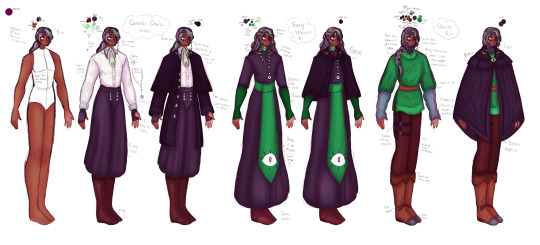
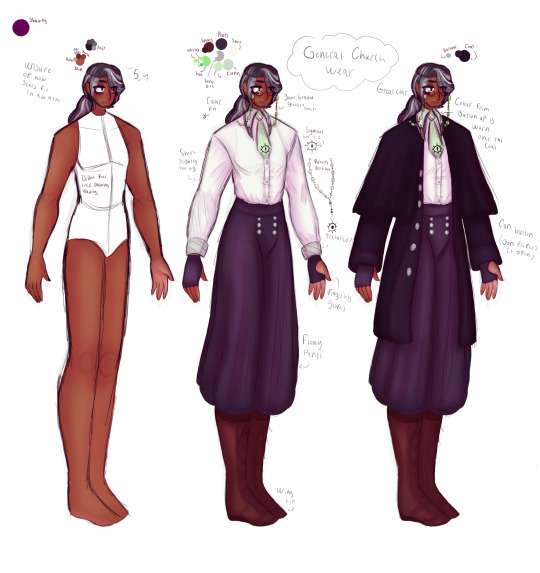
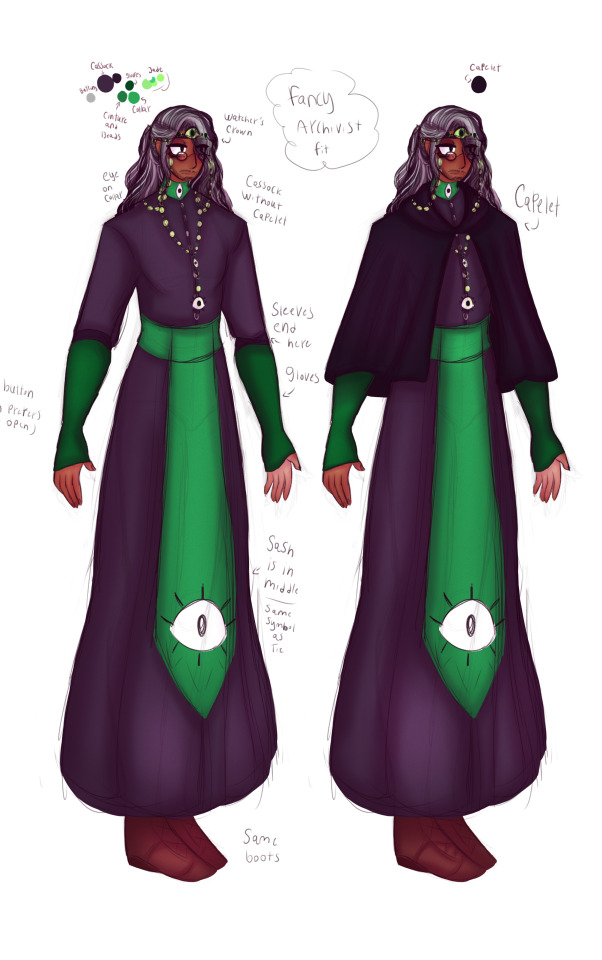

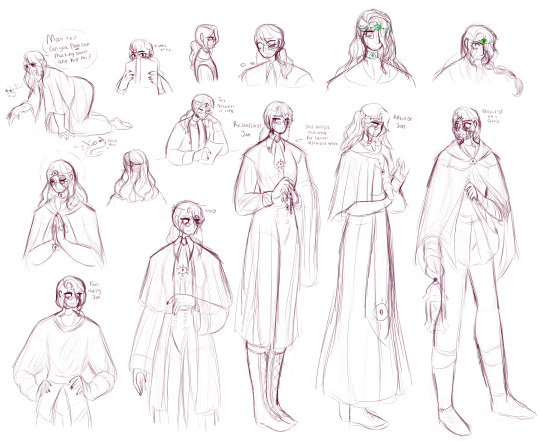
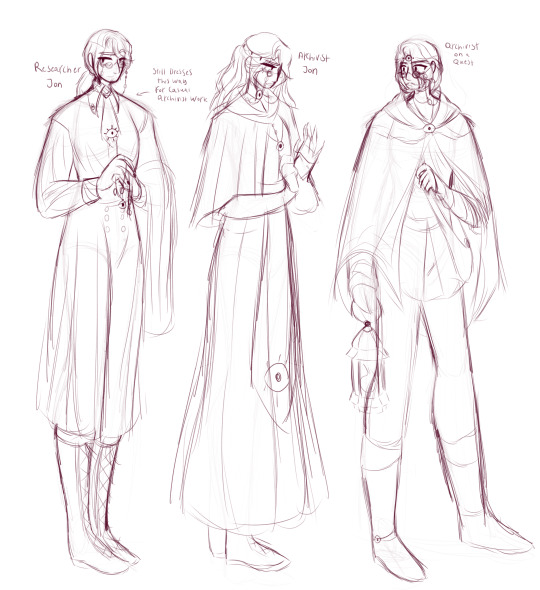
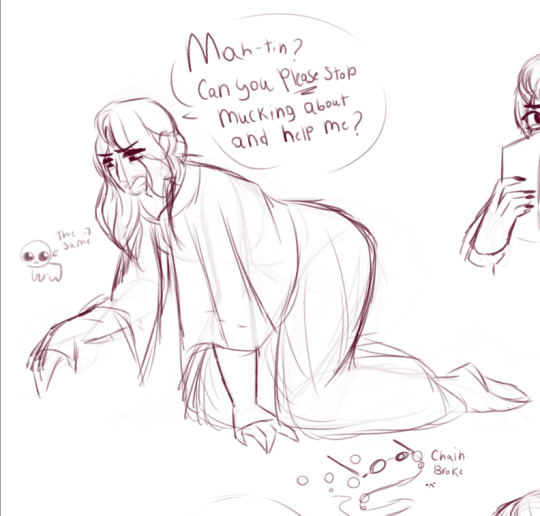

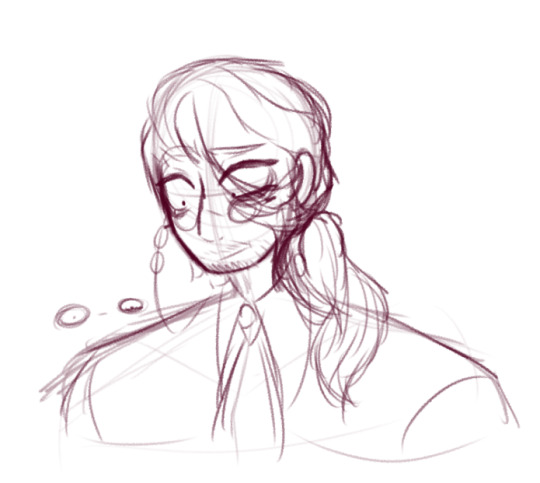
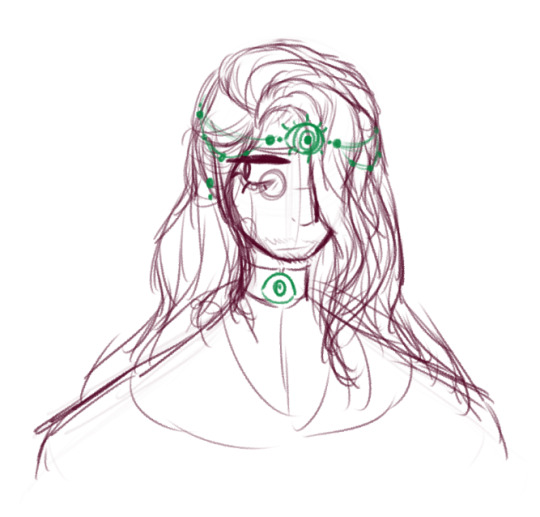

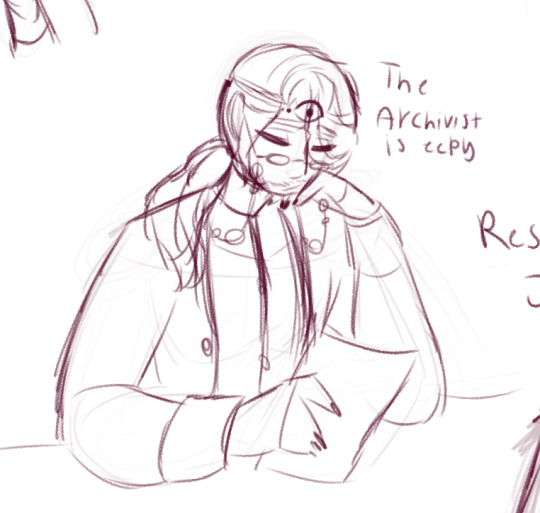
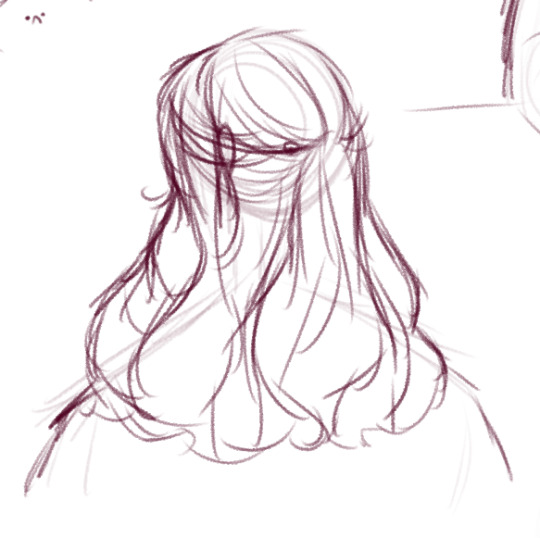
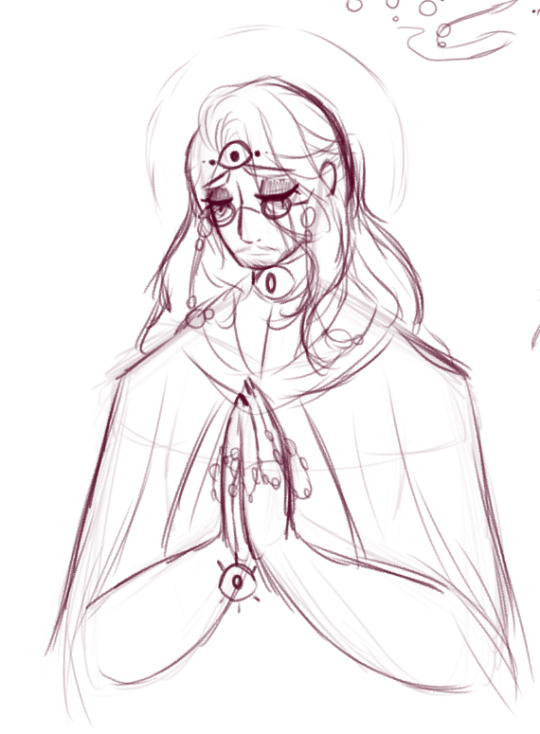


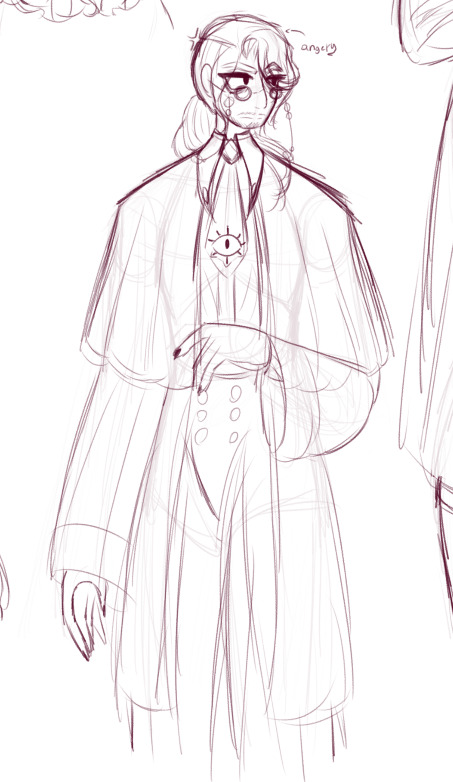
hi friends :D! i FINALLY finished my concept art for mythos!Jon and im so happy with him- look at him. plese. i spent so long on this
the sketches were all of my initial concept art for him! he's. so fun to draw. even if it did take me a bit to figure out how to do so. i love his hair ;_; <3
overall his design is very inspired roman Catholicism but. like. more fun? idk lol i just vibe with it. might make the tie darker? and the gloves with his cassock might look good with another color? eh! whatev, i might change it i might not- but this is it so far :D!
for context the Magnus Mythos is an au where the fears are gods rather than paranormal entities like in canon- here is my initial post on that if you want to know more! or if you just want to see art of the Ceaseless watcher :3!!! im really so happy so many of y'all seemed to like it ;w; it makes me feel so warm aa ilu all <3
putting all Jon's lore stuff under the cut!!!
highly recommend you read the linked post because alot of this probably wont make much sense otherwise dsjgfdjgfdb-
so, as a young child Jon grew up neutral on religion. his grandmother didn't favor any one of the gods more than the other and that sort of thinking carried over to him for a good while
when Jon was 8, he had a close encounter with a creature born from the Web: a giant spider that would tell you your fate (and possibly offer you a gift) if you gave it a sacrifice
Jon had found an old fable book with a map to it's nest. of course he had no intention of following it, just enjoying the stories inside! but a thief snagged the book from him- and upon realizing what the book led too -took Jon with him as his sacrifice
when they reached the nest after a long journey, the thief presented Jon to the spider. but the spider did not take him, it took the thief- and the little Jon could only watch, frozen in terror, as his captor was eaten by the giant spider.
after it finished its meal, the spider told Jon that his fate was of a cosmic importance, "I'm quite excited to see how this plays out," it said.
naturally this was kinda traumatizing for the child that literally just wanted to read but ok :l
the whole experience brought jon a phobia of spiders, a distrust and fear of strangers, general paranoia, ptsd, and a rejection of the webs power and the concept of fate as a whole
now- its not uncommon for some people to reject the powers of certain gods? some things born from their power are quite unpleasant, so there are steps one may take to protect themselves from the powers of one or more of the gods. (its complicated to explain but i hope that makes sense-)
suffice to say jon does NOT want to be controlled or have his fate decided by anyone or anything like that! being THAT important is scary!!! so he tries very hard to prevent any powers of the web coming near him- and he also tries to keep a low profile so he can live a calm and peaceful life without. yknow. being an important part of the fate of the entire bloody world.
he turns to the cult of the Beholding for salvation. after all, its whole thing is being aware and knowing things, and jon wanted nothing more than to know what wanted to hurt him and what didn't.
moving to London, he joined the House of Magnus, and went from a devotee to a researcher.
he became friends with Tim: a man who turned to the beholding out of his own rejection for the Stranger, and Sasha: a young woman who'd worshipped the beholding and worked at the house of magnus her entire life.
things were great for a while, and then the head archivist, Gertrude Robinson, disappeared.
normally the previous archivist would choose someone to pass the position down to, but her disappearance meant that the current head of the church, Elias, would have to choose instead. and he gave the position to Jon
it was absurd! Jon didn't want the position of archivist- everyone knew about the prophecy and Jon certainly didn't want that much pressure on him!!
not to mention- it became pretty much expected that Sasha would become the next archivist! given her history of devotion, her skills, all the work she did for everyone, hell- Gertrude even mentored her for half her life for god's sake!
Elias's reasoning was that Gertrude had broken the Archivists oath: to always protect and preserve knowledge. he claimed that the Ceaseless Watcher itself had requested Jon rather than Sasha, as Gertrude's choices were not to be trusted. and it was not up for debate what their patron wanted...
so there was no choice. jon was terrified, sasha was devastated, and tim was furious for them both.
the ceremony went on, jon was given the Watchers Crown (the sacred headpiece of the archivist) and then he went down to the archives with tim and sasha as his chosen assistants.
Elias sent down another down with them- Martin, a librarian who devoted himself to both the eye and the web. Jon was not so keen to be trusting a devotee of the web, especially with all the stress going through his head at the moment- so he wasn't very warm to martin.
as the archivist- jon does his best to do the work he was given, frequently requesting help and teachings from sasha as she clearly knew more about this than him. all throughout, he squished any spider he found. and stubbornly refused to give in to any possible notion of him being the one from the prophecy. he couldnt be. he refused it.
but the will of one man is far outweighed by that of a god, and at some point he just might have to accept the responsibility he deep down knows is his...
AAAAAAAAAAA THAT WAS ALOT- if you read this entire fucking essay then just know i love you so so so much and i am hugging you tightly ;_;
thanks for dealing with another round of my brainrot!! im thinking of working on sasha, martin, or the web's design next :3
#my art#myart#religious themes#religion tw#tma#magnus archives#the magnus archives#magpod#tma fears#the fear entities#tma au#the magnus mythos#the archivist#jonathan sims#tma jon#jon sims#jarchivist#digital art#long post
40 notes
·
View notes